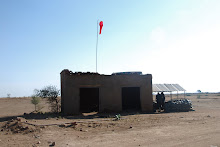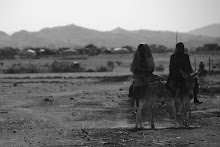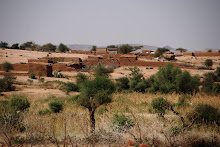A lot has been written lately on the complexity of the Darfur Crisis – armed groups have splintered and lawlessness has led to an increase in banditry and opportunism. Pundits disagree on the numbers killed and displaced, the main perpetrators, and the moral lines.
But very little has been written on the complexity of the humanitarian response itself. There seems to be a general consensus that if we had more humanitarians on the ground, things would be better. Little is said of the legal and ethical lines being walked by the international community, not to mention the almost insurmountable physical challenges to successful peacekeeping in the area.
Iraq analysis has often served as a foil to Darfur in the media - the discussion of the complex internal dynamics in Iraq fueling a civil war, the perception of American troops on the ground, etc vs. the characterization of an Arab ‘genocide’ in Darfur – so much so that some Darfur advocacy groups have pushed the slogan “Out of Iraq and Into Darfur.”
Missing from the Darfur issue is public discussion on the interface between humanitarians and the place, the people, and the conflict. Humanitarians, by their very motives, seem excused from this scrutiny. But, the international presence in Darfur is similar to interventions elsewhere, like Iraq, and has an enormous impact on an inter-state conflict. There is no such thing as a neutral - and a balanced impact is the best we can hope for. Our presence can fuel an insurgency, give legitimacy to armed groups, provide targets that win popular support, increase arms availability, etc.
Imagine first the physical challenges - UNAMID is a billion dollar a year mission, pasted on to a small town in an enormous desert. Fuel, generator parts, computers, paper, pens, chairs….everything…must be shipped by sea to Port Sudan, where the containers are unloaded onto trucks for 3,000 mile journey, 1,000 of which are not only unpaved, but untracked. The trucks must go around each little bush, into and out of each little ravine. And upon arrival they must be unloaded without a crane.
There are 10,000 people in the Mission who need heath care, food, water, and benefits. We are building a medium sized city from scratch, with mostly imported goods, in the middle of Africa. Imagine.
Which lead to the political challenges - Thousands of displaced people see the cars and trucks going by, but haven’t yet seen much improvement or tangible support. Men on horseback with AK-47s hijack Armored Personal Carriers because the UN cannot afford (politically) to shoot ‘civilians.’ Fuzzy relations with contractors hired to build the city who may have fuzzy relations with any number of groups creates conflicts on interest.
There is opportunism on all sides. Displaced Persons’ camp leaders exaggerate numbers to increase relief supplies. NGOs exaggerate problems or their ability to solve them to increase funding.
And there is tension between all the actors in a very stressful, high-stakes situation. Some NGOs have already been pressured to leave Darfur by the government, claiming that their work contributed to the evidence in the ICC documents indicting President Bashir. Some organizations emphasis on accountability prevents others from working, and vise versa.
These are the type of issues I will explore, hopefully slower and more coherently, in this blog :)
Saturday, October 11, 2008
Subscribe to:
Post Comments (Atom)













































No comments:
Post a Comment